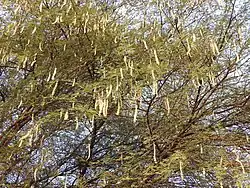طلح
Arabic

Etymology
From the root ط ل ح (ṭ-l-ḥ) originally meaning “to be successful or contented” as it was a fruit tree that camels overindulge eating; negative associations from the root stem from the negative effects of overeating. Applied in a general way to all flourishing fruit-bearing trees, especially the eating of which is enjoyed.
Often times glossed as Musa (“banana tree”) in its Qurʾānic occurrence, though such an understanding is considered unlikely there; for more see Banana, their existence in Arabia at the eve of Islam[1] and the possible connection of South Arabian trade routes as a potential source of the fruits' introduction to the African continent.
Pronunciation
- IPA(key): /tˤalħ/
Noun
طَلْح • (ṭalḥ) m (collective, singulative طَلْحَة f (ṭalḥa), plural طُلُوح (ṭulūḥ))
- Vachellia
- 609–632 CE, Qur'an, 56:28-29:
- فِي سِدْرٍ مَّخْضُودٍ وَطَلْحٍ مَّنْضُودٍ
- fī sidrin mmaḵḍūdin waṭalḥin mmanḍūdin
- [They will be] among buckthorn trees with thorns removed and vachellia trees layered [with fruit]
-
- a fruit-bearing tree
Declension
| Collective | basic collective triptote | ||
|---|---|---|---|
| Indefinite | Definite | Construct | |
| Informal | طَلْح ṭalḥ | الطَّلْح aṭ-ṭalḥ | طَلْح ṭalḥ |
| Nominative | طَلْحٌ ṭalḥun | الطَّلْحُ aṭ-ṭalḥu | طَلْحُ ṭalḥu |
| Accusative | طَلْحًا ṭalḥan | الطَّلْحَ aṭ-ṭalḥa | طَلْحَ ṭalḥa |
| Genitive | طَلْحٍ ṭalḥin | الطَّلْحِ aṭ-ṭalḥi | طَلْحِ ṭalḥi |
| Singulative | singulative triptote in ـَة (-a) | ||
| Indefinite | Definite | Construct | |
| Informal | طَلْحَة ṭalḥa | الطَّلْحَة aṭ-ṭalḥa | طَلْحَة ṭalḥat |
| Nominative | طَلْحَةٌ ṭalḥatun | الطَّلْحَةُ aṭ-ṭalḥatu | طَلْحَةُ ṭalḥatu |
| Accusative | طَلْحَةً ṭalḥatan | الطَّلْحَةَ aṭ-ṭalḥata | طَلْحَةَ ṭalḥata |
| Genitive | طَلْحَةٍ ṭalḥatin | الطَّلْحَةِ aṭ-ṭalḥati | طَلْحَةِ ṭalḥati |
| Dual | Indefinite | Definite | Construct |
| Informal | طَلْحَتَيْن ṭalḥatayn | الطَّلْحَتَيْن aṭ-ṭalḥatayn | طَلْحَتَيْ ṭalḥatay |
| Nominative | طَلْحَتَانِ ṭalḥatāni | الطَّلْحَتَانِ aṭ-ṭalḥatāni | طَلْحَتَا ṭalḥatā |
| Accusative | طَلْحَتَيْنِ ṭalḥatayni | الطَّلْحَتَيْنِ aṭ-ṭalḥatayni | طَلْحَتَيْ ṭalḥatay |
| Genitive | طَلْحَتَيْنِ ṭalḥatayni | الطَّلْحَتَيْنِ aṭ-ṭalḥatayni | طَلْحَتَيْ ṭalḥatay |
| Paucal (3-10) | sound feminine paucal | ||
| Indefinite | Definite | Construct | |
| Informal | طَلْحَات ṭalḥāt | الطَّلْحَات aṭ-ṭalḥāt | طَلْحَات ṭalḥāt |
| Nominative | طَلْحَاتٌ ṭalḥātun | الطَّلْحَاتُ aṭ-ṭalḥātu | طَلْحَاتُ ṭalḥātu |
| Accusative | طَلْحَاتٍ ṭalḥātin | الطَّلْحَاتِ aṭ-ṭalḥāti | طَلْحَاتِ ṭalḥāti |
| Genitive | طَلْحَاتٍ ṭalḥātin | الطَّلْحَاتِ aṭ-ṭalḥāti | طَلْحَاتِ ṭalḥāti |
| Plural of variety | basic broken plural triptote | ||
| Indefinite | Definite | Construct | |
| Informal | طُلُوح ṭulūḥ | الطُّلُوح aṭ-ṭulūḥ | طُلُوح ṭulūḥ |
| Nominative | طُلُوحٌ ṭulūḥun | الطُّلُوحُ aṭ-ṭulūḥu | طُلُوحُ ṭulūḥu |
| Accusative | طُلُوحًا ṭulūḥan | الطُّلُوحَ aṭ-ṭulūḥa | طُلُوحَ ṭulūḥa |
| Genitive | طُلُوحٍ ṭulūḥin | الطُّلُوحِ aṭ-ṭulūḥi | طُلُوحِ ṭulūḥi |
References
- Löw, Immanuel (1934) Die Flora der Juden (in German), volume 4, Wien und Leipzig: R. Löwit, page 67
- Lane, Edward William (1863), “طلح”, in Arabic-English Lexicon, London: Williams & Norgate, pages 1865-1866
- Khair Tuwair Said Al-Busaidi; Directorate General of Agriculture and Livestock Research, Ministry of Agriculture and Fisheries, Crop ProductionResearch Centre, Sultanate of Oman, 2013